Places to visit in Lahaul and Spiti invite visitors to witness tough mountains, glacial rivers, and high-altitude deserts in Tibetan Buddhist culture. This remote Himalayan region is an eyes-and-soul feast, renowned for dramatic treks, peaceful monasteries, and pretty tribal villages. From the ancient monastery corridors of Key Monastery to the scenic meadows around Chandratal Lake, every corner offers you tranquillity and adventure. Whatever your passion; nature, culture, or adventure trekking, Lahaul & Spiti offers untouched mountain majesty.
Top 10 Places To Visit In Lahaul And Spiti
These places to visit in Lahaul and Spiti are to be enveloped in unspoiled wilderness, spiritual calm, and indelible mountain views.
1. Key Monastery (Ki Gompa), Spiti
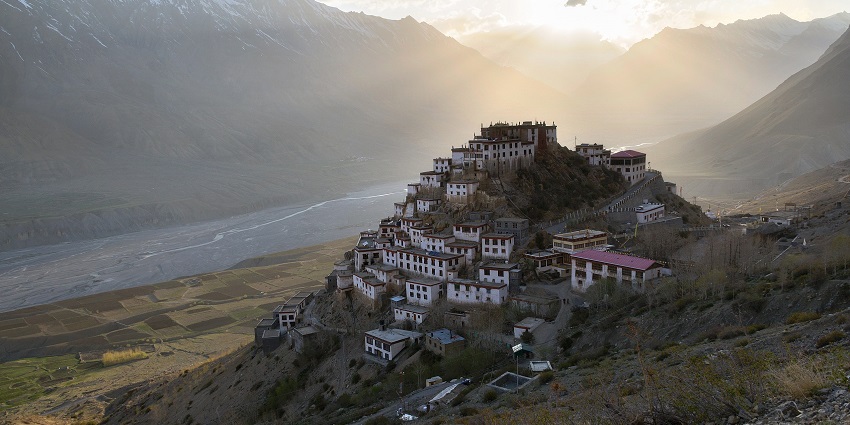
Photo: Prasad Gaude / Wikimedia Commons
Key Monastery, or Ki Gompa, is one of the most famous and spiritually significant symbols of Spiti Valley. At over 4,100 meters high, it’s situated at the top of a stunning hill, looking down on the blue Spiti River and the wide valley below. This 11th-century monastery in Spiti is the biggest one and an ongoing centre of monastic learning, where junior monks study texts, chants, and rituals from elderly lamas. Its labyrinthine corridors, prayer halls, and chambers are adorned with murals, faded thangkas, and images of deities. Tourists can see the serene daily routine of the monks, attend prayer rituals, and experience the awe-inspiring views.
Location: Spiti Valley, Key Monastery, Lahaul and Spiti District, Himachal Pradesh, India
Major Attractions: Monastery complex, prayer halls, panoramic valley view
2. Tabo Monastery
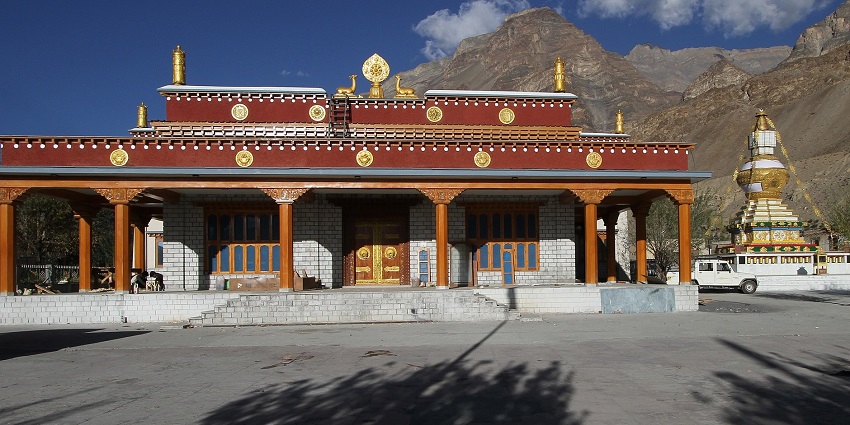
Photo: Gerd Eichmann / Wikimedia Commons
Tabo Monastery is popularly referred to as the “Ajanta of the Himalayas”. It is one of the oldest and most revered Buddhist monasteries in India, dating back to 996 AD. It is one of the most significant places to visit in Lahaul and Spiti. Located in the Tabo village of the Spiti Valley, the monastery is a treasure trove of centuries-old Vajrayana Buddhist art and culture. Its nine monasteries, a few stupas, and monks’ quarters are adorned with elaborate frescoes, life-size paintings and thangkas. The most significant structure in the monastery, the Assembly Hall or Tzongkhang, possesses walls painted beautifully with frescoes.
Location: 39VM+C56, Tabo, Dhar Gangchhumi, Spity Valley, Himachal Pradesh
Major Attractions: Frescos, old temples, monastic library, village culture of the local populace
3. Dhankar Monastery & Lake
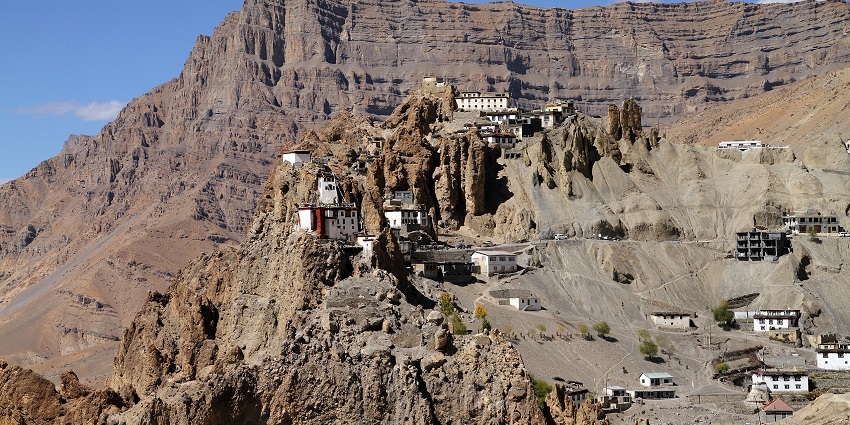
Photo: Gerd Eichmann / Wikimedia Commons
Dhankar Monastery, or Dhankar Gompa, spectacularly perches on the top of a rock cliff at an altitude of over 3,800 meters. It overlooks the stunning confluence of the Spiti and Pin rivers. The erstwhile capital of the Spiti Valley royal family, this 1,000-year-old monastery is an engineering wonder. The monastery holds centuries-old thangkas, Buddhist scriptures, and prayer rooms. It gives a glimpse of the region’s well-rooted monastic culture. Above them are the caves of meditation that echo with centuries of spiritual silence. A short trek up leads to the breathtaking Dhankar Lake which is a glacial lake framed against dramatic mountains and alpine meadows.
Location: 36Q7+R29, Sichling-Dhankhar Gompa, Dhankhar, Spiti, Himachal Pradesh
Major Attractions: Himalayan views, lake, monastery museum
4. Chandratal Lake
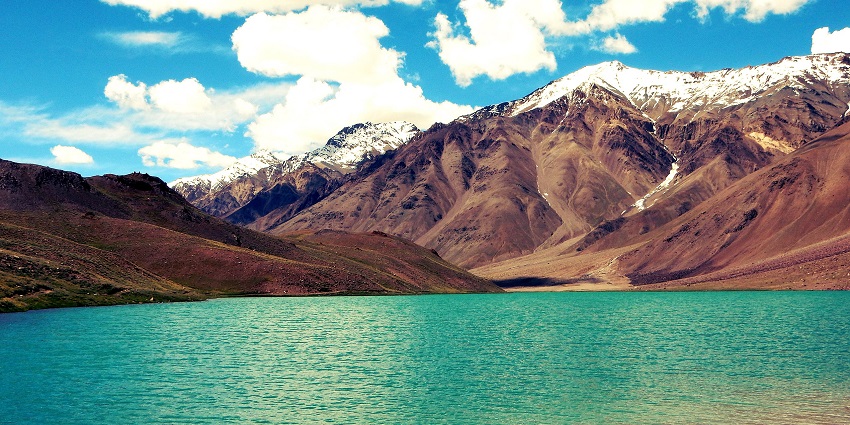
Photo: Vivek Kumar Srivastava / Wikimedia Commons
Dedicated to “Moon Lake,” Chandratal is one of India’s most stunning high-altitude lakes at an altitude of approximately 4,300 meters. It is one of the famous places to visit in Lahaul and Spiti. The crescent shape of the lake is what gives it its name. Its changing colour of the water from turquoise through emerald green to dark blue makes the lake an unearthly site. The lake itself is surrounded by scree slopes, wildflower meadows in summer, and snowy silence in winter, a twelve-month visual feast. Reachable via a challenging trekking route near Batal, Chandratal is a campers’ and trekkers’ paradise.
Location: Upper Chandra valley of the Lahul and Spiti district
Major Attractions: Treks, star-gazing, camping
5. Baralacha Lake
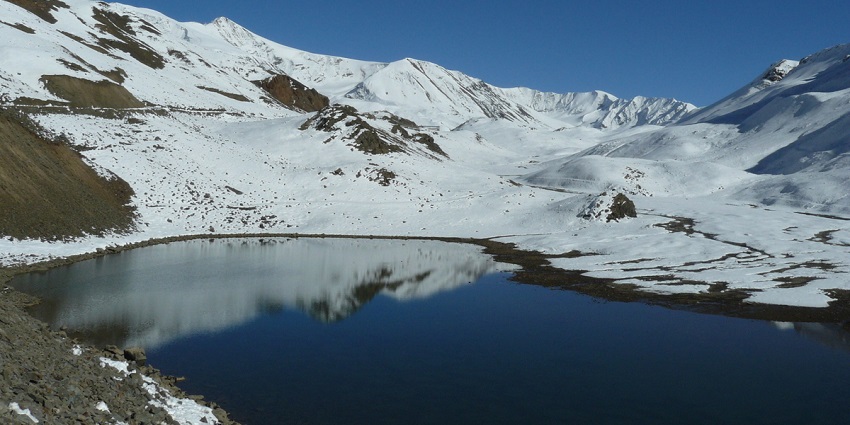
Photo: Ankit Solanki / Wikimedia Commons / Image For Representation Only
Higher still is the breathtaking Baralacha Tso (or Baralacha Lake), a glacial lake, surrounded by three mountain ranges at an altitude of around 4,890 meters. Its sapphire blue-green waters reflect the precipitous peaks and scudding clouds, creating an otherworldly, dreamlike look. Summer is given over to Alpine grasslands of tiny flowers that sweep down to create a serene respite from the wilderness. The ride is as stunning as it is thrilling and precisely what road trip fans would appreciate.
Location: Manali-Leh highway, Lahaul and Spiti
Major Attractions: High-altitude lake, Zing Zing Bar viewpoint
6. Kaza And Kibber
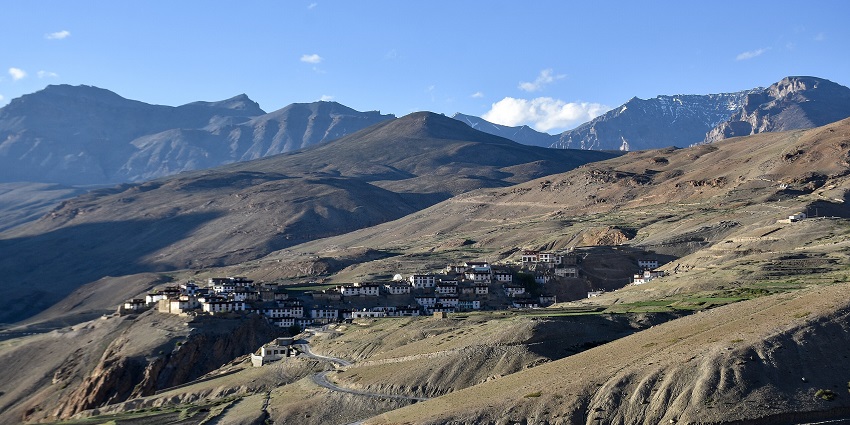
Photo: Timothy Gonsalves / Wikimedia Commons
The colourful administrative town of Spiti Valley, Kaza, blends modernity with tradition. Its colourfully vibrant bazaar is the perfect place to shop for local handicrafts, woollens, and souvenirs. Its peaceful cafés and guesthouses welcome with warm hospitality a glimpse of high-altitude life. A one-hour drive down is Kibber, which lies at around 4,200 m above sea level and is among the world’s highest inhabited villages. Nested in striking mountain scenery, Kibber features genuine mud-brick houses, wind-torn prayer flags, and yak herds grazing on alpine pastures. The village is also used as an entrance to wildlife watching in the surrounding Kibber Wildlife Sanctuary.
Location: Spiti sub-division of Lahul and Spiti district
Major Attractions: Local village life, cafes, homestays
7. Lahaul Valley & Keylong
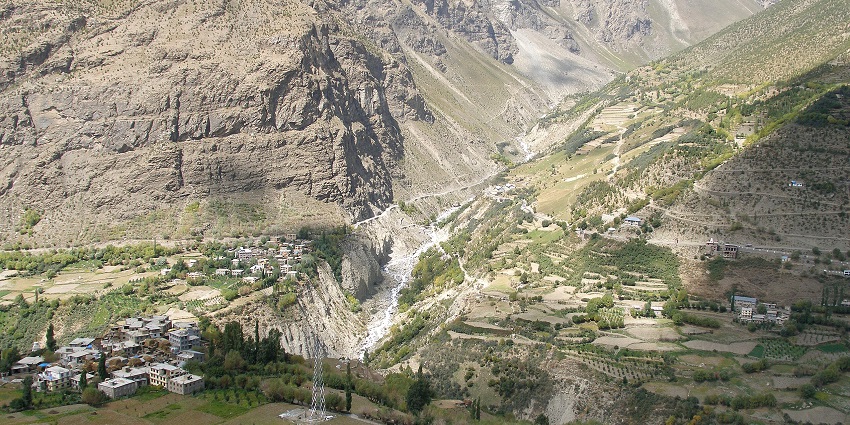
Photo: Vyacheslav Argenberg / Wikimedia Commons
Lahaul Valley is a lush high-altitude haven sculpted by the meandering Chandra River. While the dry landscape of Spiti is dominated by grey mountains, the rolling meadows, falling waterfalls, and pine-clad slopes of Lahaul paint a more vibrant picture. At its core is Keylong, an administrative capital, which has a mix of Tibetan and Himachali culture. Whitewashed houses, ancient monasteries like Kardang and Shashur, and hiking trails along the Bhaga River are some of the attractions in the town. The villages of Sissu and Jispa, around Keylong, are serene getaways that are perfect for unwinding alongside freshwater streams.
Location: Within the Lahaul and Spiti district of Himachal Pradesh
Major Attractions: Jispa, Sissu, Buddhist temples, river valleys
8. Kunzum Mata Temple & Chandrabhaga
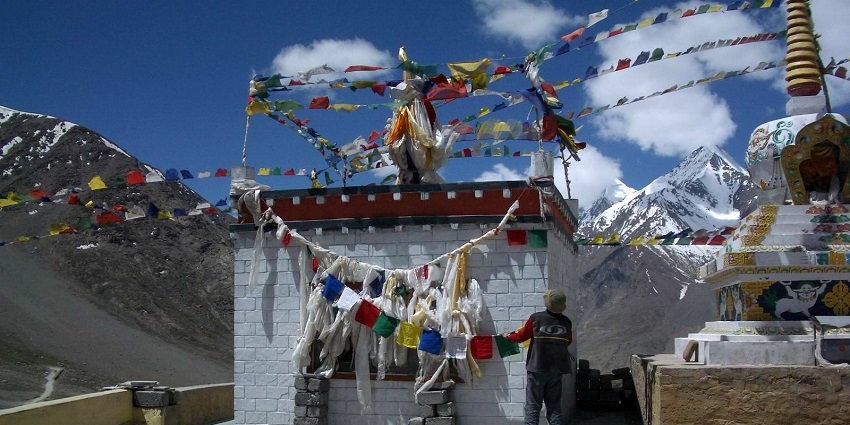
Photo: John Hill / Wikimedia Commons
Located on the windy Kunzum Pass at an altitude of 4,551 m, the Kunzum Mata Temple holds deep religious significance for travellers and locals. It is one of the important spiritual places to visit in Lahaul and Spiti. Devotees seek blessings from the presiding deity, which is believed to guard the high passes. Pilgrims are seen waving prayer flags in the air, and they circumambulate the temple in a clockwise ritual before going further. At the foot of the pass lies the majestic Chandrabhaga Glacier which is the birthplace of the Chandra River. Towering peaks and glacial moraines form a breathtaking environment here.
Location: Kunzum Pass, Lahaul and Spiti district
Main Attractions: View of glacier, shrine, high-altitude scenery
9. Moravian Village & Langza
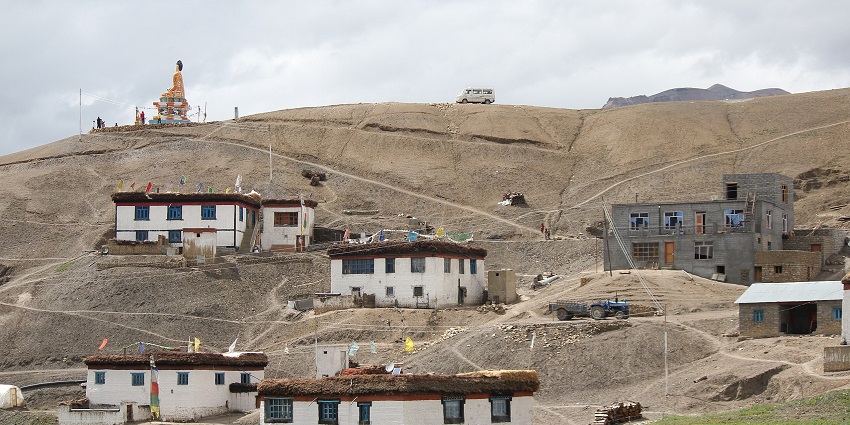
Photo: Sumita Roy Dutta / Wikimedia Commons
Moravian Village and Langza are two of the most intriguing hamlets in Spiti, offering an immersion in Himalayan life and history. Moravian Village, with its distinctive wooden houses, agricultural terraces, and yak corrals, has a way of life that has endured for centuries. Langza, some 4,400 m away and just a hop, skip, and jump from here, is equally stunning for its astounding mountain views. Standing tall above Langza is a massive golden Buddha statue, smiling serenely over the valley. This legendary figure provides a spiritual touch to the landscape, representing harmony and endurance.
Location: Lahaul district
Major Attractions: Village stroll, dinosaur fossils, Buddha image, mountain view
10. Koksar
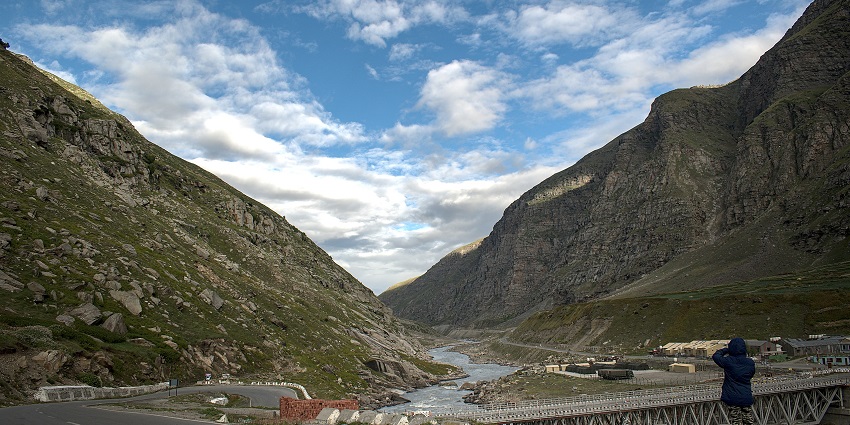
Photo: ADARSHluck / Wikimedia Commons
Koksar offers a stunning finish to your journey in Lahaul and Spiti. Koksar is one of the first villages in Lahaul after crossing over the Rohtang Pass from Manali. It is a rugged, high-altitude village renowned for rugged residents, ancient stone houses, and Tibetan-influenced culture. As you drive higher up the Manali – Leh road, the views are replaced by a climactic mix of dry ridges and icy water crossings.
Location: Just after the Atal Tunnel, Lahaul
Major Attractions: Mountain pass landscape, rustic majesty
From remote monasteries nestled in arid valleys to heart-stopping high-altitude treks, places to visit in Lahaul and Spiti radiate unbridled Himalayan beauty. This country is awed by its cliff-theatrical ridges, lake-glacier landscapes, ancient Buddhist past, and serene oases. Whether you are an admirer of silence or a connoisseur of action, Lahaul & Spiti is guaranteed to leave you with irreplaceable mountain memories. Plan your trip with TripXL and come on this breathtaking journey into the heart of the Indian Himalayas.
Cover Photo: Shiva Garg / Wikimedia Commons


 WhatsApp
WhatsApp
 Twitter
Twitter









